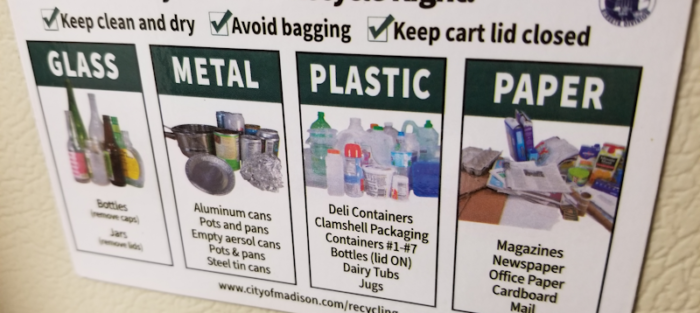What intelligent waste management for the city of tomorrow
Today’s technological innovations aim to improve life tomorrow, while also seeking to reduce costs, protect our environment and establish a true circular economy. This is also true with regard to waste management: the goal is to succeed in recycling as much garbage as possible, to limit collection transportation and to rid urban areas of the thousands of trash cans that sit on the sidewalks.
Are we capable of meeting this challenge? Good news: it seems that many initiatives have already seen the light of day all over the world and are in full development, just waiting to be improved to be adapted in all major cities. Want to know more ? Urbyn shows you what waste management could look like in our cities in a few years!
Why imagine a new intelligent way to manage waste
Like almost everywhere in the world, the population continues to grow in Wisconsin. Result: more and more waste must be incinerated, treated and recycled, in Madison and other Wisconsin cities. From a logistical point of view, it becomes complicated when there is a lack of labor or when material resources are not sufficient. It is not uncommon to see piles of trash piled up on city sidewalks, which end up looking like a landfill. Not only is it unhygienic, it is also relatively unpleasant and unattractive.
Furthermore, we must not forget the cost that this waste management represents for the community. A research study for the year 2022 showed that this service then cost $293 excluding tax per inhabitant. Suffice it to say that on a national scale, this represents a significant sum. Smarter waste management solutions can therefore also be beneficial for the economy, through the reduction of costs linked to collection, recycling, treatment of household waste, management of recycling centers, flows, etc.
What solutions are envisaged to improve waste management
Faced with these challenges, waste management companies have decided to put innovation at the heart of products and services intended to revolutionize waste management in communities, from the smallest towns to large cities.
For almost ten years, many cities in Wisconsin have experimented with the introduction of chips on private dumpsters. How does it work? The chip determines the weight and/or volume of waste in the bin when it is collected, then the household waste tax is calculated based on these figures. In other cases, households are subject to a TOM flat rate, which is increased if the number of bin exits for collection is exceeded.
It is therefore a financial incentive, which pursues two objectives:
- encourage residents to reduce their volume of household waste, which can be done by opting for zero waste or through the composting of organic waste;
- promote the recycling of plastics, cardboard, glass, etc. : if these packaging are placed in the sorting bins, they do not clutter up traditional garbage bins.
This system also makes it possible to collect useful data on collection times and frequency, thus making it possible to improve the collection circuit.
Connected trash cans to optimize recycling and collection
To go even further, some companies have opted for connected urban dumpsters which provide additional data: filling rate, composition of the waste thrown away, etc. Thanks to this real-time information and long-term data analysis, communities are able to optimize collection. In fact, it becomes easier to know when it would be wisest to come and empty the skips, so as to avoid unnecessary journeys.
In the end, there are fewer CO2 emissions and savings made.
In the future, we could also see our cities equipped with smart urban trash cans capable of recycling our waste themselves. How is this possible? Thanks to materials detection and Internet of Things technologies. The principle is actually quite simple: when waste lands in the trash can, the latter is able to determine what it is, then direct it to the corresponding underground bin (bins for plastics, for metals, for organic waste, for cardboard, etc.).
Thanks to a system connected to collection services, it is then possible to automatically inform them that a bin is full and that it must be taken to the corresponding incineration or sorting center. Here again, flows can be optimized and sorting errors considerably reduced.
Underground collection to reduce road transport flows
In Wisconsin, cities like Madison have been experimenting with faster collection. Collective bins are thus connected to sorting centers by pipes, which allow the consumer’s waste to be sent directly to the place where it will be recycled. By promoting the development of this solution throughout the urban territory, it is possible to almost completely do without collection trucks.
Fewer greenhouse gas emissions, less road traffic and fewer trash cans left on the streets: this system seems to have only advantages. However, this intelligent device involves significant work and is not necessarily suitable for all cities. The fact remains that it is a solution which is attracting more and more communities and which has even been implemented in certain districts of the capital. Could this be the ecological collection of the future?
Transforming waste into a source of energy
What if we allowed the recovery of waste in the city, to eliminate household waste and turn it into resources for the production of more environmentally friendly energy? This circular system already exists in several cities in Wisconsin: waste is collected then goes through the methanization process to become biogas. It is thus possible to power thousands of homes. And organic materials that could not be transformed can be reused for the production of compost.
This system could also see the light of day in private homes: dumpster rental and junk disposal companies have created tanks of a few liters which transform household waste into biogas, directly at home. Despite sometimes being difficult to set up in urban areas, this device nevertheless remains interesting in rural areas, where the terrain often allows the installation of such a tank to power household appliances or the heating system, in almost complete autonomy.




Comments are closed.